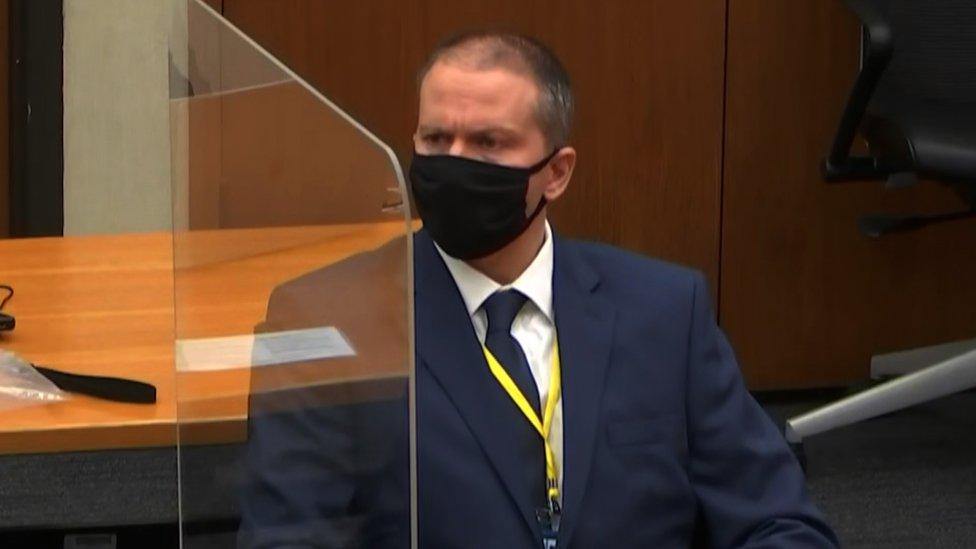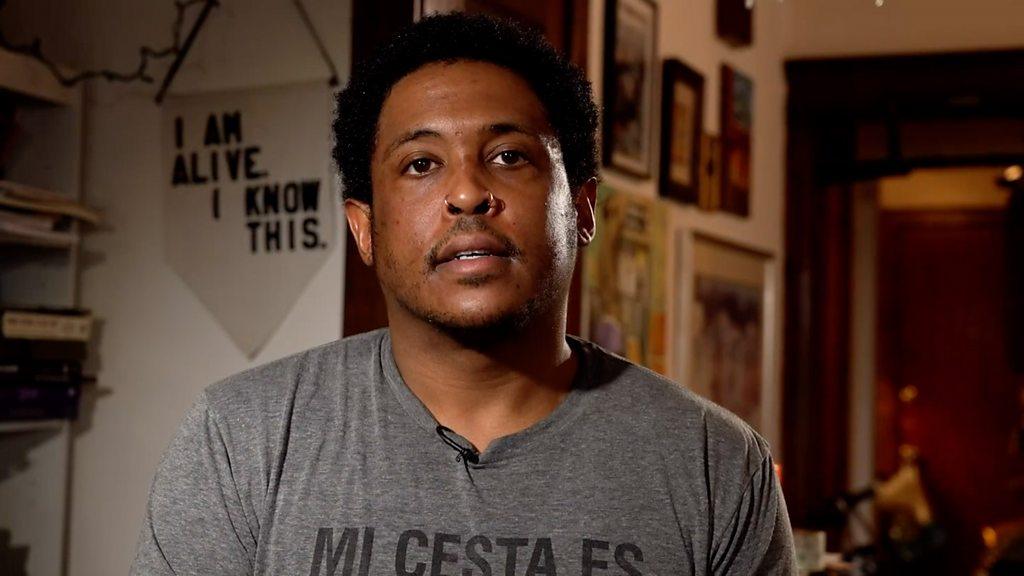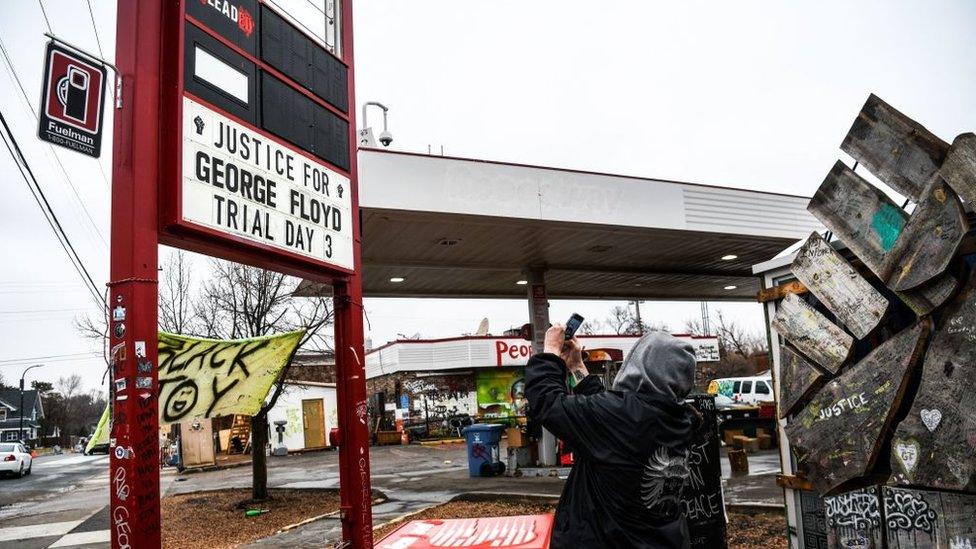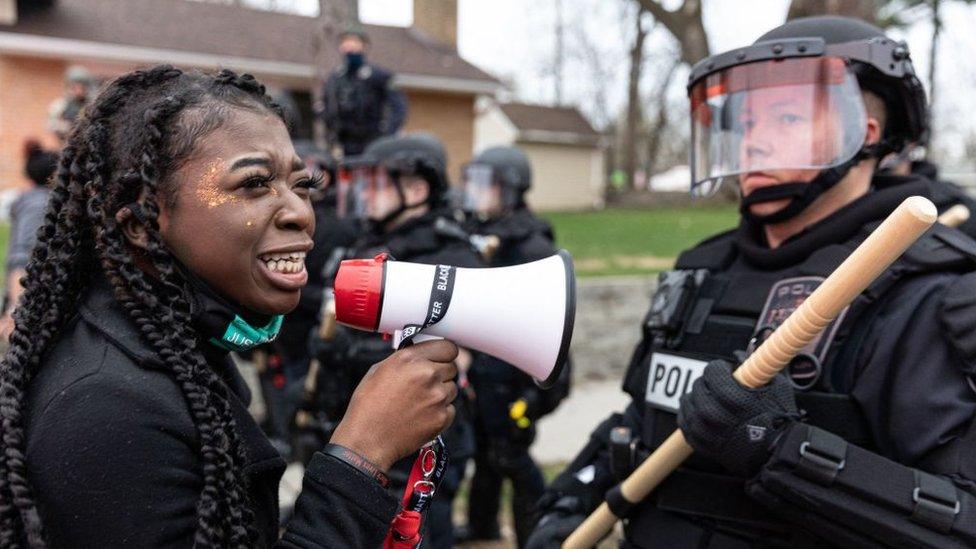Derek Chauvin trial: What we learnt and key questions answered
- Published

Derek Chauvin, pictured on the first day of jury selection
The trial of Derek Chauvin, the former US police officer accused of killing George Floyd last year, will soon come to a close.
The case has attracted huge global attention and after three weeks of witness and expert testimony, the jury will meet to decide the outcome on Monday.
Here we explain what's happened so far, and BBC correspondent Tara McKelvey - who has been in Minneapolis throughout the trial - answers questions from BBC audiences about the case that led to protests around the world.
What we have learnt so far in the Chauvin trial
A reminder of the background to the case; white police officer Derek Chauvin, now 45, is on trial in Minneapolis after the death of George Floyd in May last year.
During Mr Floyd's arrest on suspicion of using a counterfeit $20 note at a food store, Mr Chauvin knelt on his neck in the street for more than nine minutes. After repeating "I can't breathe" more than 20 times, Mr Floyd, who was 46, died.
Video recorded by eyewitnesses sparked global protests over racial injustice and violent policing.
Mr Chauvin was later charged with third-degree murder, second-degree murder and manslaughter.
A jury of 12 people, who have been hearing arguments since 29 March, must decide if Mr Chauvin will face time in jail or be acquitted.
Prosecution lawyers have claimed that Mr Chauvin used excessive and deadly force without justification. They say that Mr Floyd died from being subdued and not from drug use or ill health, as the defence has argued.
The top homicide investigator in Minneapolis testified that Mr Chauvin used "totally unnecessary" force.
The defence argued that Mr Chauvin's use of force against Mr Floyd was justified because he faced an "imminent threat" from the suspect.
Watch: How the prosecution made its case against Derek Chauvin
Experts called by Mr Chauvin's legal team said the former officer's behaviour did not deviate from Minneapolis police department policy and law enforcement standards.
On Thursday, Mr Chauvin declined to give testimony, citing his constitutional right to remain silent.
What are the differences between the three charges Chauvin faces?
Readers have asked about what Mr Chauvin is charged with and what the prosecution have to prove in each case.
BBC correspondent Tara McKelvey explains the three charges of manslaughter, second-degree murder and third-degree murder.
Manslaughter is when someone unintentionally causes another person's death.
In second-degree murder, the act that led to someone's death could have been intentional or unintentional. The maximum sentence is 40 years in prison.
Third-degree murder means an individual has acted in a way that endangered one or more people, ending in death. This charge was added later and experts say it is easier to prove in court, but the jail sentence would be lower.
Police officers have rarely been convicted - if they are charged at all - for deaths that occur in custody, and the verdict in this trial is being widely seen as an indication of how the US legal system will treat such cases in future.
Are the jurors sequestered?
Yes, from Monday, explains Tara McKelvey. Being sequestered means they will be isolated from contact with the outside world, including TV and other media.
The jurors will arrive at the courthouse on Monday morning, with suitcases packed.
The lawyers from the defence team and the prosecution will make their closing arguments, summarising key points of their case, and then the judge will explain to the jury important legal aspects they should consider.
Watch: The three key arguments used by Chauvin's defence
Then, the jurors will be taken to a hotel, where they will remain during their deliberations.
A lawyer arguing for Mr Chauvin asked the judge to sequester the jury earlier in the trial following the high-profile shooting by a police officer in Minneapolis of 20-year-old black man Daunte Wright. The judge denied the request.
What happens if the jury don't return a unanimous decision?
Several readers asked if the charges would be dropped if the 12 jury members fail to reach a unanimous decision.
All the jurors have to agree in order to reach a verdict, explains Tara McKelvey. If they do not, there will be a "hung jury", which means the jurors were unable to reach a conclusion.
At that point, the judge could declare a mistrial. A second trial would then have to take place, and the process would start again.
Why aren't the other officers involved being prosecuted for not intervening?
The other former officers, Tou Thao, Thomas Lane, and J Alexander Kueng, who were with Mr Chauvin during Mr Floyd's arrest, have been charged with aiding and abetting.
They are due to face trial in August.
What were the qualifications of the defence witnesses?
Several readers asked questions about the debate over whether the field of forensic science has a racial bias. It comes after the Journal of Forensic Sciences published a study, external which showed that medically irrelevant information like the victim's race can sway the decisions of forensic pathologists.
During the trial, medical experts testified about Mr Floyd's cause of death, including forensic pathologist David Fowler, who was a witness for the defence.
Mr Fowler was formerly a chief medical examiner in the US state of Maryland. He has also taught classes at the University of Maryland School of Medicine as an adjunct associate professor.
His work for the state of Maryland was controversial, and the American Civil Liberties Union has criticised his tenure, stating that his office was "complicit in creating false narratives about what kills black people in police encounters".
- Published9 April 2021

- Published30 March 2021

- Published21 April 2021
